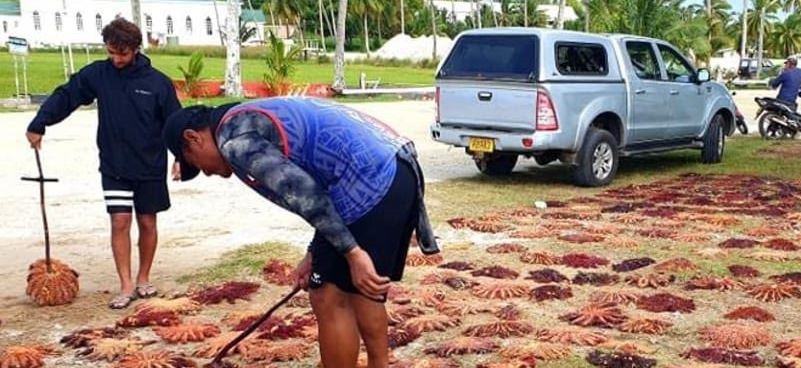It’s not as colourful: Cook Islanders working to make tourism regenerative
Thursday 16 November 2023 | Written by RNZ | Published in Economy, National, Tourism

More than 6,600 crown-of-thorns starfish have been removed from the reefs since 2020. Photo: Supplied/23111505
Visitors to the Cook Islands are being encouraged to look beyond the picture perfect post-card and give back to the environment when holidaying there. By Eleisha Foon of RNZ Pacific.
“Regenerative tourism” is becoming a special experience for visitors wanting to be climate change conscious.
Growing up in the Cook Islands the ocean has been a playground for Donald Hallin, known as Dee.
He learned through ancestral teachings that they are the “guardians” of the sea.
The Cook Islands-born Go Locals tourism director provides ocean turtle and eagle ray tours as well as other ocean adventures.
“That is our job, we are just here to look after it and pass it on to the next generation,” he said.
Hallin is concerned about the deteriorating state of the ocean.
“It’s not as colourful as it used to be. Less fish. It’s not how it used to be.”
Te Ara O Teakou founder Alex King is combatting this by launching a coral restoration project.
King hopes both locals and visitors get involved with the initiative.
“We're spreading the message of just how important our coral reef is and how much it provides for our basic living. It is one of our food sources,” she said.
“Personally, I would really love to see more community involvement.”
She has teamed up with Dee and his team, including Go Local Beach operations manager, Ravinga Teau, who is already making a difference.
“Our goal is to give people the chance to plant a coral and maybe we put up a plaque up with their names on it to show people's contribution to the island,” Teau said.
There are many ways tourists can give back whilst visiting the Cook Islands, such as donating or volunteering with the SPCA (Society for the Prevention of Cruelty to Animals) to planting native species along the banks to prevent coastal erosion with Muri Environmental Care.
Removing crown-of-thorns starfish was another way tourists can protect coral when they are diving in the ocean.
More than 6500 coral eating crown-of-thorns starfish have been removed from Cook Islands’ reefs since 2020 when the latest outbreak was first detected.
Cook Islands regenerative tourism manager Jeremy Goodwin said sustainable travel was the goal, which some members of the Cook Islands community had already been doing for years - but were now finally getting recognised for it.
“Mana Tiaki celebrates us as local people to extend the right to our visitors to enjoy their vacation but keep it in a greener space,” Goodwin said.
As for waste and recycling on the main and outer islands, the goal is to have zero waste in the Cook Islands by 2045.
On outer islands where there’s no landfill and on Rarotonga, there’s only one.
In 2019, the Cook Islands government set aside funding for an industrial-sized glass crusher to deal with the nearly thousand tonnes of glass ending up in the landfill each year.
The machine turns glass into sand that can be used for concreting, thus achieving a dual objective: reducing the amount of rubbish going into the landfill, and allowing sand to stay on beaches.
It allows for nearly half the weight of the island’s waste to be diverted from the landfill.
Goodwin said there was potential to not only reduce waste but also to repurpose materials like plastic in Rarotonga and the outer islands.
“The dreams we have from regenerative tourism is the business opportunities. I have seen plastic bottles that can be turned into chopping boards...there are green ways out in the world and our hope is that people will move into that space.”
Goodwin hoped visitors to the Cook Islands would get behind regenerative tourism.
He said it has the potential to make a positive difference that will last generations.
However, Alex King said there is power in community initiatives and she was unhappy with the lack of government support.
“I didn’t think our government was taking these sorts of issues seriously,” she said.
“When you start something there is a ripple effect. It has started to do that so I feel positive about the future.”















































